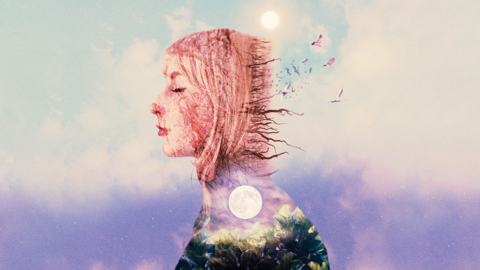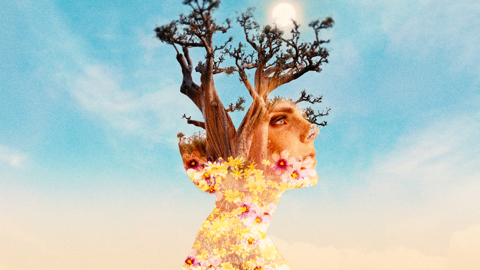LIMELIGHT - ★★★★ "A wonderful package of bite-sized Australian works, and a long-awaited world premiere from an Australian legend."
Originally scheduled for 2020, the world premiere of Ross Edwards' Vespers for Mother Earth has been a long time coming. Now, it’s finally seen the light of day as the centrepiece of The Song Company’s 40th Anniversary Gala, performed in the second half of a two-part program.
The first half dived into the pool of works commissioned by The Song Company across its 40-year history and surfaces with 10 quite varied, bite-sized Australian pieces, capped by one world premiere (and, forgivably, one exciting Dutch work). Though it didn’t forge too much new ground, it was quite lovely programming that ranged from Peter Sculthorpe’s gorgeous The Stars Turn to some of Andrew Ford’s brief Australian Aphorisms and Elena Kats-Chernin’s Mater, with a woodblock and all of her trademark charm in tow.
Katy Abbott’s Flying, which draws its lyrics from an article by Michael Leunig, was a standout, with dreamy, interweaving lines that soar over a lush, harmonic bed.
Raffaele Marcellino’s Memory was another. The performers worked like broken tape machines as notes slid ever lower, with a beautiful uncertainty as to whether they would they stick the landing together in a chord, or be left to keep falling.
There was also a haunting, untitled work by Alice Chance. With co-Artistic Director Jessica O’Donoghue as soloist, Chance’s wordless vocal fry is a siphon for a grief otherwise inexpressible; a really interesting choice of vocal technique. Following it, Sonya Holowell’s Become Like Children was the first work to use staging as a structure to play with – both onstage and off, as the composer recited lines for the work from her seat to bookend the piece – and made for an interesting and impassioned reflection on the Uluru Statement from the Heart.
The afternoon’s program, in fact, had two world premieres. Featuring lyrics he had penned himself, Angus Davison’s Lime Song was a sweet and pure ode to love and joy. It’s woven out of simpler harmonic fibres, but Davison uses this to make his chordal twists really grabbing, rather than employing any off-theme dissonance or darkness.
Named by O’Donoghue as The Song Company’s “party trick”, Pelle Gudmundsen-Holmgreen’s Bats’ Ultrasound was the non-Australian concession, but it was one that was very easy to forgive. There was an off-kilter joy and energy in the snappy soprano flourishes and sharp breath sounds. Closing the first half, Martin Wesley-Smith’s boppy Who Stopped the Rain? was perhaps a bit stylistically ill-fitting, but was it still a great choice to hang the intermission on.
Co-Artistic Director and soprano Amy Moore was replaced due to illness by Brisbane-based Annika Hinrichs, one of The Song Company’s 2024 Emerging Artists. Though she had less than three days to rehearse the works in-person, her sweet and delicate soprano fitted well with the group. The performance from the company, as a whole, was close to perfect.
Vespers for Mother Earth begins with a gentle meditation. A lone light illuminated shakuhachi player Lindsay Dugan on the top balcony accompanied by the sounds of running water.
Then, from air to earth – Dugan’s toying with overtones was taken over by didjeridu player Matthew Doyle, who opened the second movement, the aria Flame of the Sun. Here, Susannah Lawergren and harpist Genevieve Lang made an astonishing duo as they moved between moments of beauty and abrupt stops.
Within each section, and under the baton of an ever-sharp Roland Peelman, Edwards’ music flowed faultlessly. Edwards is keenly aware of how much energy each of his phrases have; and how much it can use up before it has to fizzle out. This skill is at the heart of the work, where the boundaries of the piece are stretched to fit it; unusual, unequal time signatures are a mechanism to preserve continuity, rather than dice it up.
The piece was spurred by flawless performances across the board. The percussive collection of Claire Edwardes and Joshua Hill (filling in for Bree van Reyk) added such mightiness to the whole thing, and brass was employed with a restrained hand. (Trumpeter Dominic Longhurst and trombonist Nigel Crocker made few appearances throughout the piece, but it was huge when they did). Flautist Lamorna Nightingale and saxophonist James Nightingale nailed every entry and added great spirit. Unamplified, Lu Liu’s pipa was quieter, but still beautifully played.
Highlights included a lengthy cello solo by Julian Smiles – his performance, revelling in the drama of it all, was absolutely exquisite – and a storm that tears through the centre of the piece, where the ensemble played all together for the first time alongside Eleanor Brimblecombe’s soundscape.
The final movement, O Magnum Mysterium, was just beautiful in The Song Company’s hands. Casting a lonely gaze towards the universe, hoping to discern some meaning from it all, there couldn’t have been a more fitting end.
With inventive staging and lighting, Edwards’ Vespers was not just presented but honoured, clearly handled with respect and love. There are not many groups larger than The Song Company that would dare program such an ambitious work in its entirety, or make it the main meal of a concert in the second half. Leaving a little tearfully, I felt proud to be bearing witness to the creation of new Australian work, and the talent our composers (and performers) display if allowed the space. (Maddy Briggs)
CLASSIKON - "An outstanding showcase of some of Australia’s finest"
What a joy and privilege it was to join a sell out crowd to celebrate 40 years of Song Company excellence and spend a couple of hours reflecting on this ensemble’s massively rich legacy.
The concert unfolded in two distinct halves: The first was a whirlwind tour of Australian vocal chamber music commissioned by the ensemble in the last 4 decades and in the second we witnessed a true master of the genre, with the world premiere of Ross Edwards’ monumental work Vespers for Mother Earth, a reflection on ecological themes and humanity’s connection to the natural world.
As The Song Company is credited with over 120 commissions I did not envy co-artistic directors’ Amy Moore and Jessica O’Donoghue’s task in programming the first half. They succeeded in presenting a beautiful snapshot of quirky, humorous, poignant, emotive, as well as harmonically and technically challenging vocal sextets – quintessentially “The Song Company”.
Beginning with Peter Sculthorpe’s well-known and much loved The Stars Turn (1970 arr 1985) and including songs from Martin Wesley-Smith (1990), Stuart Greenbaum (1991), Raffaele Marcellino (1995), Elena Kat-Chernin (2000), Andrew Ford (2012/13) and Katy Abbott (2015), the program read like a who’s who of renowned local composers, all of whom were performed with great relish and arranged into four elegantly themed sets, however I felt the true stars of this half were the three most recent works.
Alice Chance’s Untitled (2019), commissioned for O’Donoghue, explores the idea of vocal fry, characterised by a low, crackling, croaky sound produced by fluttering or vibrating the vocal folds irregularly. With no title and no words, and only the sound and performance to convey emotion, the soloists’ guttural sounds formed a deep expression of anguish resonating in and out of a lilting melody – hugely successful.
Sonya Holowell’s Become like Children (2022) magnifies the compelling plea of the Uluru Statement From The Heart, employing diverse modes of composition and conceptual exploration to challenge its performers to navigate between adult resilience and childhood innocence, blending assertive notated refrains with improvised ‘playground’ soundscapes. I still recall this work when it premiered and was very glad to have the opportunity hear it again.
Angus Davison’s Lime Song, a world premiere commissioned by Penny Le Couteur and Greg Dickson, was my highlight of this half. Davison has an uncanny ability to musically capture the sweetness of small things – the perfume from scratching the skin of a lime, the sound of an ant’s footstep… he asks us to “lean in, squint, and open ourselves to the beauty of something small…. to draw attention, just for a moment, to tiny experiences that seemed to fill a universe.” I felt like this song was a rare and generous gift from the composer.
To my ear, all of these works were performed faultlessly by the current Song Company crew Susannah Lawergren, Jessica O’Donoghue, Timothy Reynolds, Hayden Barrington and Andrew O’Connor. Wait, that’s only five voices – we sadly were missing Amy Moore due to illness but the amazing Song Company Emerging Artist, Brisbane based Annika Hinrichs (in her Sydney debut) stepped in at the 11th hour to replace Moore for this part of the concert, her fresh zesty soprano perfectly complimenting the more experienced singers. Well done indeed!
In the second half the singers were augmented by Anna Fraser, Hannah Fraser and Louis Hurley, alongside a stellar ensemble of guest instrumentalists and it was a delight to see Roland Peelman back on the conductor’s podium for the concert’s centrepiece, Ross Edwards’ Vespers for Mother Earth. This was an epic premiere of ambitious scope with profound ecological themes. Inspired by natural sounds and Monteverdi’s iconic Vespro della Beata Vergine, it unfolded in seven movements, each a reflection on nature’s beauty and the urgent need for its preservation. Edwards’ distinctive musical language, rooted deeply in Australia’s cultural and environmental heritage, resonates powerfully.
It starts gently, with just the sound of water, then a lone Shakuhachi invoking the morning ceremoniously breathes light and life into the void. Birdsong fills the space as the solo is passed to the didjeridu. From within this soundscape the ecstatic soprano of Susannah Lawergren emerges with only Genevieve Lang’s stunning harp accompaniment in the Flame of the Sun aria.
The choir and various instruments join in Bird and Flower Chants and continue to build to Zenith, the music rising from a stillness to shrill intensity. There is at times a particularly eastern flavour to the music with the unusual instrumentation pairing shakuhachi with flute, and pipa (a traditional plucked Chinese instrument) with harp and then cello.
Orison an extended cello solo described as ‘ruminative, sometimes unquiet’ had a yearning feeling and was beautifully articulated by Julian Smiles. The hymn-like Canticle of the Earth was inspired by the universal dance of life acknowledging a Buddhist Deity, who is known as the embodiment of compassion, beginning a cappella with winds, percussion and plucked strings taking the dance to it’s close. A truly stellar cast of musicians.
Ross Edwards’ musical homage to Mother Earth transcended its ecological message to become a profound meditation on humanity’s place in the natural order. The final movement, O Magnum Mysterium, a gentle a cappella contemplation, derived it’s text from the commentary of astronomer Professor Fred Watson and offered us a reflection on the mysteries of existence. In a kind of cyclic return to the beginning of things, the work ends as it began, with the sound of water and finally, deep silence.
A huge roar from an appreciative crowd closed The Song Company’s 40th anniversary gala, an outstanding showcase of some of Australia’s finest, many of whom were in the audience to join in the celebration. A triumphant concert marking a massive milestone in Australian musical history. Here’s to another 40 years! (Pepe Newton)


